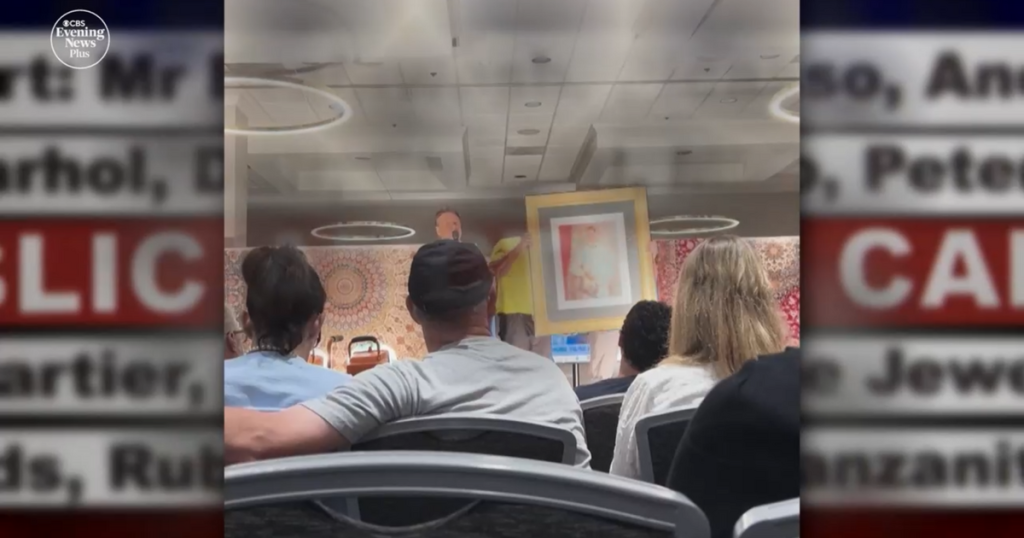The Rise of Deceptive Pop-Up Auctions in the U.S.
In recent years, pop-up auctions across the U.S. have gained notoriety for enticing customers with the promise of luxury goods at bargain prices. These auctions, often advertised with signs featuring images of fancy cars and fine jewelry, create a sense of urgency and exclusivity, drawing in hopeful bargain hunters. However, the reality behind these auctions is far less glamorous, as the goods sold are frequently misrepresented, leading to significant financial losses for unsuspecting buyers.
The Fine Print and Misrepresentation
A closer examination of these auctions reveals a more sinister reality. The fine print on auction websites often states that descriptions of items are merely opinions, not facts. This legal loophole allows sellers to avoid accountability for the authenticity of their goods. At an auction in Northbrook, Illinois, CBS News observed a bustling room filled with items purported to be Persian rugs, expensive jewelry, and fine art. However, the website’s disclaimer made it clear that buyers were taking a significant risk, as the descriptions were not guaranteed to be accurate. This lack of transparency has led to numerous cases of buyers purchasing items that turn out to be worthless or significantly overvalued.
A Victim’s Story: Rebecca Simmons
Rebecca Simmons’s experience at a pop-up auction in October 2021 is a stark example of the deceptive practices common in these events. Simmons spent $6,000 on a piece of art purported to be an authenticated Picasso. However, an independent appraiser later determined that the piece was merely a cheap reproduction, worth a mere $70. Simmons described feeling "taken advantage of" and "very angry" upon discovering the truth. Her experience highlights the emotional and financial toll such scams can have on individuals. When Simmons attempted to contact the auction organizers for recourse, she found that the phone number listed on the auction signs was no longer in service, a common tactic used by these operators to avoid accountability.
The Elusive Auctioneers
The individuals behind these pop-up auctions are notoriously difficult to track down, often operating under multiple business names and zuus. An investigation into their backgrounds revealed a history of legal issues, including penalties, suspended licenses, and expired permits across multiple states. Two names repeatedly surfaced in connection with these operations: Azam and Anwar Khan, based in Virginia, just outside of Washington, D.C. Despite attempts to contact them, the Khans did not respond to requests for comment. Their evasion of accountability underscores the lack of transparency and integrity in these operations.
Calls for Accountability and Reform
Congresswoman Jan Schakowsky of Illinois’ 9th congressional district has called for the Federal Trade Commission (FTC) to investigate these pop-up auctions for deceptive practices. Schakowsky emphasized that these auctioneers are "not above the law" and expressed her commitment to using her influence to bring an end to these practices. However, the FTC did not respond to CBS News’ requests for comment, leaving many victims and advocates frustrated and seeking further action. The lack of response from the FTC raises concerns about the agency’s ability or willingness to address these issues effectively.
Education and Awareness: The Key to Prevention
Industry expert and auctioneer Renee Jones stresses the importance of educating the public to prevent further scams. Legitimate auctions, Jones notes, do not "pop up" without warning. Instead, they are typically preceded by weeks of marketing, accompanied by online catalogs, and operate with transparent business practices, including publicly displaying their licenses. Jones’ insights highlight the need for consumers to be vigilant and to thoroughly research any auction before participating, especially those that appear too good to be true. By raising awareness and promoting transparency, it may be possible to reduce the prevalence of these deceptive practices and protect consumers from falling victim to such scams.
In conclusion, the proliferation of pop-up auctions across the U.S. has revealed a troubling trend of deception and exploitation. These auctions, while enticing with promises of luxury goods at bargain prices, often deliver low-quality or counterfeit items, leaving buyers with significant financial losses and a deep sense of betrayal. To combat this issue, greater consumer education, stricter regulatory oversight, and active enforcement of existing laws are essential. Until such measures are taken, the public must remain vigilant and cautious, recognizing the red flags of these deceptive operations.















